Astronomy Highlights
 See a beautiful early morning conjunction an hour before sunrise today. The waning crescent Moon teams up with a stunningly brilliant Venus and striking Regulus to bring a dazzling sight to the constellation of Leo the Lion. Graphic from
See a beautiful early morning conjunction an hour before sunrise today. The waning crescent Moon teams up with a stunningly brilliant Venus and striking Regulus to bring a dazzling sight to the constellation of Leo the Lion. Graphic from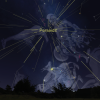 The Perseid meteor shower peaks tonight! The waning gibbous Moon will brighten up the sky significantly, but grab a blanket, stretch out on the lawn and try to spot a few.The radiant of the shower is in the constellation Perseus. The meteors will
The Perseid meteor shower peaks tonight! The waning gibbous Moon will brighten up the sky significantly, but grab a blanket, stretch out on the lawn and try to spot a few.The radiant of the shower is in the constellation Perseus. The meteors will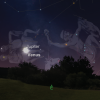 The two brightest planets will be very close together for the next three mornings (11-13th) and at their closest on the 12th, separated by less than 1-degree.Set your alarm and don’t miss the sight — as they won’t have this close of a conjunction
The two brightest planets will be very close together for the next three mornings (11-13th) and at their closest on the 12th, separated by less than 1-degree.Set your alarm and don’t miss the sight — as they won’t have this close of a conjunction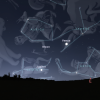 This month the symmetry before dawn continues. Look to the east this morning around 4:30am to see a beautiful thin crescent Moon perfectly framed between Venus, 11 degrees to the upper right, and Jupiter, 11 degrees to the lower left. Graphic
This month the symmetry before dawn continues. Look to the east this morning around 4:30am to see a beautiful thin crescent Moon perfectly framed between Venus, 11 degrees to the upper right, and Jupiter, 11 degrees to the lower left. Graphic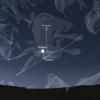 Early risers will be treated to a beautiful sight this morning before dawn as Venus brings symmetry to the Bull’s v-shaped face. The bright star Aldebaran serves as the left eye of the bull and Venus will become the brilliant right eye, which is
Early risers will be treated to a beautiful sight this morning before dawn as Venus brings symmetry to the Bull’s v-shaped face. The bright star Aldebaran serves as the left eye of the bull and Venus will become the brilliant right eye, which is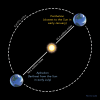 Happy Aphelion Fellow Earthlings!We’re farther away from the Sun today than any other time of the year - 94.5 million miles. But, why? Earth’s path around the Sun isn’t circular—it’s closer to an oval.So, why is it so hot if we’re far away from the
Happy Aphelion Fellow Earthlings!We’re farther away from the Sun today than any other time of the year - 94.5 million miles. But, why? Earth’s path around the Sun isn’t circular—it’s closer to an oval.So, why is it so hot if we’re far away from the Happy Summer Solstice!Everyone living in the Northern Hemisphere will enjoy the longest day of the year, while those in the Southern Hemisphere will experience the shortest day and the onset of winter.The axial tilt of our planet is the reason for
Happy Summer Solstice!Everyone living in the Northern Hemisphere will enjoy the longest day of the year, while those in the Southern Hemisphere will experience the shortest day and the onset of winter.The axial tilt of our planet is the reason for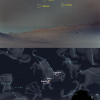 Ever wonder what the constellations look like from Mars?NASA’s Perseverance rover captured a view of the constellation of Leo a few months ago. The two of the brighter stars in Leo, Regulus and Algieba are in view, along with Deimos, the
Ever wonder what the constellations look like from Mars?NASA’s Perseverance rover captured a view of the constellation of Leo a few months ago. The two of the brighter stars in Leo, Regulus and Algieba are in view, along with Deimos, the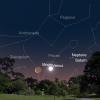 Set your alarm a little earlier this morning and wake up to a beautiful view in the eastern sky. The waning crescent Moon and Venus rise together and make a pretty pair about 30 minutes before dawn. Graphic credit: Sky Safari app
Set your alarm a little earlier this morning and wake up to a beautiful view in the eastern sky. The waning crescent Moon and Venus rise together and make a pretty pair about 30 minutes before dawn. Graphic credit: Sky Safari app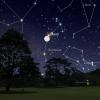 Summer is still five weeks away, but the season’s constellations are already on the rise.Tonight watch for the not quite full Moon next to the star Antares. Antares’s brilliant orange hue creates the heart of Scorpius, one of summer’s most
Summer is still five weeks away, but the season’s constellations are already on the rise.Tonight watch for the not quite full Moon next to the star Antares. Antares’s brilliant orange hue creates the heart of Scorpius, one of summer’s most


